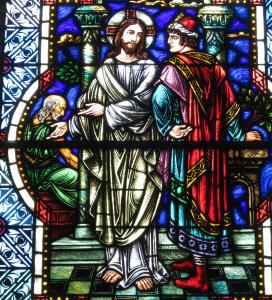
Once, Jesus was called good by someone seeking to flattery him. Not only did Jesus use the situation as an opportunity to denounce the use of such flattery, he also used it to indicate to everyone that only God is unconditionally good:
And a ruler asked him, “Good Teacher, what shall I do to inherit eternal life?” And Jesus said to him, “Why do you call me good? No one is good but God alone. (Lk. 18:18-19 RSV).
We must be careful when we read what Jesus said. He did not deny that he was good, he only asked why he was being called good. Saying the right words is not enough. When said with the wrong intention, the meaning and implication of words change. What can be correct, when said with the right intention, can be false with the wrong one. This is why we must be careful and not assume someone using the right words mean the right things with those words. With bad intentions, equivocation easily leads people astray. Jesus understood this, which is why he questioned the motive of the ruler. Since many people asked Jesus questions for the sake of some ideological trap, it is quite possible that the ruler thought that if he used flattery, Jesus would let his guard down and say something which could be used to condemn him. Instead, Jesus turned the trap around, and asked the ruler why he would call someone good when God alone is simply good without conditions (everyone else, if they are called good, will be called good because of the way they open themselves up to and participate in the good which lies beyond themselves; for God, that good lies within the divine nature itself and comes from it instead of being something God participates in from some external source).
God is good. God is the source and foundation of every goodness. This is one of the lessons which we can learn from Jesus. If we want what is good for ourselves, we should seek God. Then, when we find God, we should do what it takes to unite ourselves with the divine nature, for that is how we will be able to participate with the good for ourselves. Thanks to grace, thanks to our union with God, insofar as we are united with God, we are good. Indeed, all things are made to be good, that is, made to participate in the goodness of God. When we talk about them being good by nature, we only do so conventionally, understanding that God’s grace established that nature and gave it its goodness. If someone or something should try to be good by themselves, that is, apart from God, they will find that goodness will depart from them because they have departed from God and God’s grace. Thus, we must remember, all goodness always comes from God, and our greatest good comes from union with God. This is why Thalassios told us to do whatever we can to make sure we become united with God: “God alone is good and wise by nature; but if you exert yourself your intellect also becomes good and wise through participation.”[1]
Grace allows us to be deified, and so grace allows us to become good. Grace, however, is not something which is forced upon us; it is not something which will transform us against our will. We must cooperate with it. We must work out our salvation with fear and trembling, struggling throughout our life to follow the commandments of love. “Struggle until death to fulfill the commandments: purified through them, you will enter into life.” [2] Such struggle is impossible without grace, but without that struggle, grace will only serve as a potential in our life. Grace requires our cooperation to take full effect. Our sinful habits and desires impede the work of grace so long as we attach ourselves to them instead of dying to the self and letting grace come in and transform us, making us to be what God expect us to be, that is, holy as God is holy (Cf. Lv. 19:2). With grace, we will be able to be perfect analogous to the way the Father is perfect (cf. Matt. 5:48). This is also why, after telling the ruler no one is good but God, Jesus told him to do what God has commanded so that he could be led to perfection (and, by implication, become good):
You know the commandments: `Do not commit adultery, Do not kill, Do not steal, Do not bear false witness, Honor your father and mother.'” And he said, “All these I have observed from my youth.” And when Jesus heard it, he said to him, “One thing you still lack. Sell all that you have and distribute to the poor, and you will have treasure in heaven; and come, follow me.” (Lk. 18:20-22 RSV).
The law is the law of love; the commandments which come out of the law of love serve to show us the way to embrace love and to become perfect. In and of themselves, each commandment, each particular law, does not make us holy, but if we embrace all of them through grace, if we engage them as they are meant to be engaged, as commandments of love and not just as legalistic expectations, then they can work to our purification and illumination.
The ruler who came to test Jesus claimed to be near perfection, but he showed himself to be otherwise, for all he did was follow the law in a legalistic manner. He did not understand the law, that is, what the law was at its core, and so he did not let the core of the law transform him. This is why it said, “But when he heard this he became sad, for he was very rich” (Lk. 18:23 RSV). The ruler only engaged the law in the most simplistic fashion, seeking to look good in front of others instead of uniting with God and becoming good through that unity. Only by giving up all that he had, only by dying to the self, could he become perfect and have all things in and through union with God. The ruler was attached to his wealth, and so was a slave to it instead of being a true servant of God. If he wanted to be perfect, if he wanted all the riches found in union with God, he would have had to give all that he had, including his own very self, so that then there would be nothing left to stand in the way between him and God. Then, he could and would have found himself to be united with God, and in that unity, he would have found perfection; he would have become a true spiritual master. “For he who is a slave of riches guards his riches, like a slave; but the one who has shaken off the yoke of slavery distributes them, like a master. “[3]
Similar, so long as we are attached to earthly wealth, we will never find ourselves satisfied:
The natural disposition of people is that for food they want meats, for clothes they want embroidered garments, for travel they want chariots and horses, and moreover they want the riches of surplus wealth and accumulated goods. Even if provided these things, to the end of their years they would never be satisfied; this is also the natural disposition of people. [4]
God’s wealth is found in those who are lowly and despised, because such people have learned not to trust in material wealth or people, but in God alone. “God’s riches are made known when his mercy is shown towards those who are despised and lowly among men, who put their hope not in their own riches or strength, but in the Lord.”[5] This is what Jesus wanted for the ruler. He wanted the ruler to truly put into practice the perfection and holiness intended by the commandments, to look to the core of what they teach, and embrace it; in doing so, the ruler could have cast everything off, followed Jesus, and found himself embraced by Jesus and made perfect. Then, he would have learned that he was right for calling Jesus good, and the problem was he had done so for the wrong reason. For Jesus is indeed good, for Jesus is God,. And as God, Jesus was willing to share all that he had, his goodness, to those who cast all things aside to follow him. The ruler was called to become good, not by nature, but by grace. We, likewise, are given the same call. We look to Jesus and call him good. Why do we do so? Do we try to flattery him with our religious devotions? Do we take the commandments of love to heart? Do we struggle against our worst habits and sins, all those things which turn us away from the path of love, so we can be open to grace? Are we willing to forsake all things, including our very selves, in order to find perfection?
[1] St. Thalassios, “On Love, Self-Control and Life in Accordance with the intellect” in The Philokalia: The Complete Text. Volume Two. Trans. G.E.H. Palmer, Philipp Sherrard and Kallistos Ware (London: Faber and Faber, 1990), 315 [Century Two: 37].
[2] St. Thalassios, “On Love, Self-Control and Life in Accordance with the intellect,” 317 [Century Two: 80].
[3] St. Jerome, Commentary on Matthew. Trans. Thomas P. Scheck (Washington, DC: CUA Press, 2008), 90.
[4] Xunzi, The Complete Text. Trans. Eric L. Hutton (Princeton: Princeton University Press, 2016), 29.
[5] Origen, Commentary on the Epistle to the Romans: Books 6-10. Trans. Thomas P. Scheck (Washington, DC: CUA Press, 2002), 123-4.
Stay in touch! Like A Little Bit of Nothing on Facebook.
If you liked what you read, please consider sharing it with your friends and family!












